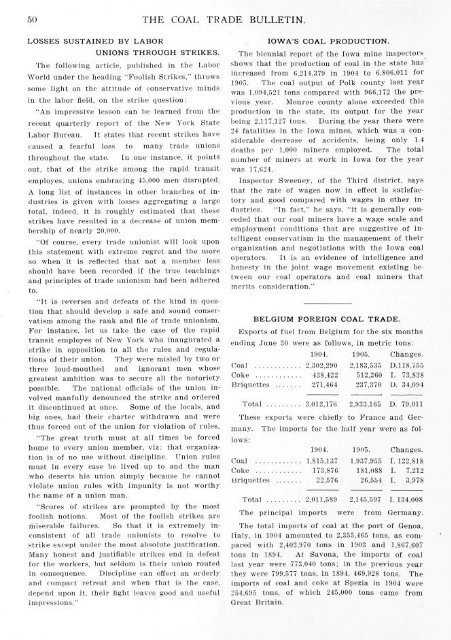COAL - Clpdigital.org
COAL - Clpdigital.org
COAL - Clpdigital.org
You also want an ePaper? Increase the reach of your titles
YUMPU automatically turns print PDFs into web optimized ePapers that Google loves.
50 THE <strong>COAL</strong> TRADE BULLETIN.<br />
LOSSES SUSTAINED BY LABOR<br />
UNIONS THROUGH STRIKES.<br />
The following article, published in the Labor<br />
World under the heading "Foolish Strikes," throws<br />
some light on the attitude of conservative minds<br />
in the labor field, on the strike question:<br />
"An impressive lesson can be learned from the<br />
recent quarterly report of the New York State<br />
Labor Bureau. It states that recent strikes have<br />
caused a fearful loss to many trade unions<br />
throughout the state. In one instance, it points<br />
out, that of the strike among the rapid transit<br />
employes, unions embracing 45,000 men disrupted.<br />
A long list of instances in other branches of industries<br />
is given with losses aggregating a large<br />
total, indeed, it is roughly estimated that these<br />
strikes have resulted in a decrease of union membership<br />
of nearly 20,000.<br />
"Of course, every trade unionist will look upon<br />
this statement with extreme regret and the more<br />
so when it is reflected that not a member less<br />
should have been recorded if the true teachings<br />
and principles of trade unionism had been adhered<br />
to.<br />
"It is reverses and defeats of the kind in question<br />
that should develop a safe and sound conservatism<br />
among the rank and file of trade unionism.<br />
For instance, let us take the case of the rapid<br />
transit employes of New York who inaugurated a<br />
strike in opposition to all the rules and regulations<br />
of their union. They were misled by two or<br />
three loud-mouthed and ignorant men whose<br />
greatest ambition was to secure all the notoriety<br />
possible. The national officials of the union involved<br />
manfully denounced the strike and ordered<br />
it discontinued at once. Some of the locals, and<br />
big ones, had their charter withdrawn and were<br />
thus forced out of the union for violation of rules.<br />
"The great truth must at all times be forced<br />
home to every union member, viz: that <strong>org</strong>anization<br />
is of no use without discipline. Union rules<br />
must in every case be lived up to and the man<br />
who deserts his union simply because he cannot<br />
violate union rules with impunity is not worthy<br />
the name of a union man.<br />
"Scores of strikes are prompted by the most<br />
foolish notions. Most of the foolish strikes are<br />
miserable failures. So that it is extremely inconsistent<br />
of all trade unionists to resolve to<br />
strike except under the most absolute justification.<br />
Many honest and justifiable strikes end in defeat<br />
for the workers, but seldom is their union routed<br />
in consequence. Discipline can effect an orderly<br />
and compact retreat and when that is the case.<br />
depend upon it, their fight leaves good and useful<br />
impressions."<br />
IOWA'S <strong>COAL</strong> PRODUCTION.<br />
The biennial report of the Iowa mine inspectors<br />
shows that the production of coal in the state has<br />
increased from 6.214.379 in 1904 to 6,806,011 for<br />
1905. The coal output of Polk county last year<br />
was 1,094,521 tons compared with 966,172 the previous<br />
year. Monroe county alone exceeded this<br />
production in the state, its output for the year<br />
being 2,117,127 tons. During the year there were<br />
24 fatalities in the Iowa mines, which was a considerable<br />
decrease of accidents, being only 1.4<br />
deaths per 1.000 miners employed. The total<br />
number of miners at work in Iowa for the year<br />
was 17,624.<br />
Inspector Sweeney, of the Third district, says<br />
that the rate of wages now in effect is satisfactory<br />
and good compared with wages in other industries.<br />
"In fact." he says, "it is generally conceded<br />
that our coal miners have a wage scale and<br />
employment conditions that are suggestive of intelligent<br />
conservatism in the management of their<br />
<strong>org</strong>anization and negotiations with the Iowa coal<br />
operators. It is an evidence of intelligence and<br />
honesty in the joint wage movement existing between<br />
our coal operators and coal miners that<br />
merits consideration."<br />
BELGIUM FOREIGN <strong>COAL</strong> TRADE.<br />
Exports of fuel from Belgium for the six months<br />
ending June 30 were as follows, in metric tons:<br />
1904. 1905. Changes.<br />
Coal 2,302,290 2,183,535 D.118,755<br />
Coke 438,422 512,260 I. 73,838<br />
Briquettes 271,464 237,370 D. 34,094<br />
Total 3,012,176 2,933,165 D. 79,011<br />
These exports were chiefly to France and Ger<br />
many. The imports for the half year were as fol<br />
lows:<br />
1904. 1905. Changes.<br />
Coal 1,815,137 1.937,955 1.122,818<br />
Coke 173,876 181,088 I. 7,212<br />
Briquettes 22,576 26,554 I. 3,978<br />
Total 2,011,589 2,145,597 1.134,008<br />
The principal imports were from Germany.<br />
The total imports of coal at the port of Genoa,<br />
Italy, in 1904 amounted to 2,355,465 tons, as compared<br />
with 2,403,970 tons in 1903 and 1,867,607<br />
tons in 1894. At Savona, the imports of coal<br />
last year were 773,040 tons; in the previous year<br />
they were 799,577 tons, in 1894, 469,928 tons. The<br />
imports of coal and coke at Spezia in 1904 were<br />
254,695 tons, of which 245,000 tons came from<br />
Great Britain.
















